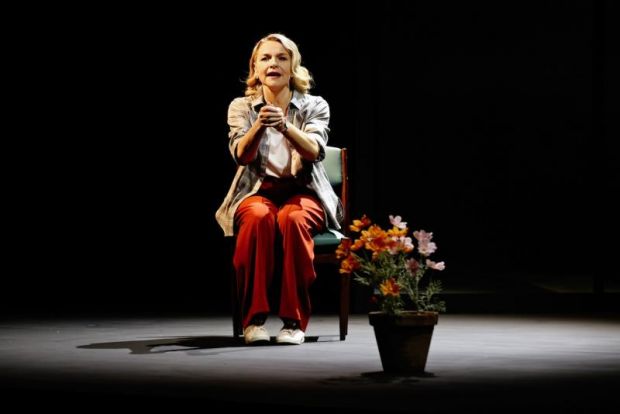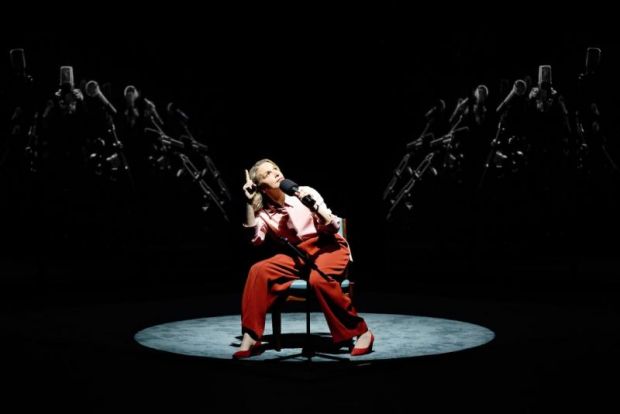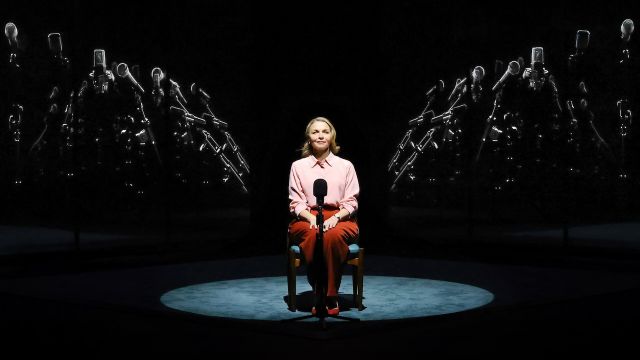Julia
It’s more than a decade since Australia’s first female Prime Minister, Julia Gillard, gave a speech that made global headlines. She took the podium during Question Time to respond to a motion proposed by the then leader of the opposition, Tony Abbot, which accused her of sexism and being unfit to lead. Her words that followed – her ‘misogyny’ speech – became instantly famous and globally viral. Playwright Joanna Murray-Smith begins Julia with the PM on the day of that speech, and then speeds us back to her roots and the experiences that shaped her.
Justine Clarke plays almost every part – and she is stunning. Clarke narrates the heartbreak of Welsh mining disasters prior to her parents leaving the valleys to live in Adelaide, then she’s the Unley High teenage Julia, already setting impossibly high expectations for herself; and then her head leans with the lop-sided sneer and stare of Abbot (it’s uncanny how easily you can see the man behind Clarke’s face). And even without the red hair and blue jacket, it’s not just the voice – her physicality changes, to be, Julia. It’s an acting masterclass as well as a tremendous and horrendous reminder of what hasn’t changed since.
She’s joined on stage by a young woman, Jessica Bentley, who shadows Clarke. She’s the younger Julia that Clarke looks back on, she’s dancing in the clubs with teenage Julia. She tends flowers, makes new growth, as Julia thinks and hurts and succeeds. Bentley never upstages Clarke but is a vital component of this monologue.

The stage is initially bare except for an angled square of carpet and a huge circular light; behind the square, glass frames reflect what is happening on the stage – yet these also become surfaces for video, brilliantly designed by Susie Henderson. It is completely integrated into the performance with abstract colours and outlines that reveal their true nature when the blur is sharpened. Sometimes the glass is a mirror, sometimes it is a screen – often it is marvellously both – with Clarke perfectly in position on stage to become a part of it, or apart from it.
The music and sound are also essential to the building and releasing of tension throughout – Steve Francis’s work here is never intrusive and complements well. Similarly, lighting designer Alexander Berlage isn’t showy with this space, illuminating Clarke in bold white light from above and below.
The story of her life is unsentimentally told, and the passion, determination, and resilience are evident in Murray-Smith’s words, but also through Clarke’s expressions – even how she sits. Helpmann Award-winning director Sarah Goodes shines a steady light on Julia’s achievements, whether they are to be proud of, or not. Goodes is also great at pacing the narrative – the audience is given time to breathe, laugh – even applaud as Clarke announces herself as the first female Deputy Prime Minister, or when the first female Governor General swears in the first female Prime Minister: ‘Two chicks!’ says Clarke, which earns a ‘whoop’ from the audience.

By the time we get to the rapidly told context that led to That Speech, even though we know what’s coming, no matter how much we think we’re going to feel, when she starts it, the audience is holding its breath. Every word, every pause, mannerism, look to the opposition benches, hits home. The audience releases its breath only to applaud wildly – not just at the performance of Justine Clarke, but for the words she just said.
Of course, there’s artistic licence, but the most senior member of parliament was publicly treated this badly on live television, radio and in our newspapers. Today’s news is still full of women being talked over, shouted down, insulted, and then heavily penalised if they dare to return fire. There’s still not equality in our factories and offices, but there is much more there than the supposedly ‘hallowed halls’ of our politicians.
Women continue to fight for their human rights and representation. Whilst this play is empowering, it does beg the question as to how little progress has been made in the twelve years since that speech. Men and media particularly have not responded nearly enough. And this is a play for both men and women, and for all political leanings, or none. If you’re too young to remember its impact, Julia is a compelling education; but if you are old enough, this is a reminder of how ashamed we should be for what was done, what continues to be done – yet optimistic for how we can do it differently. Julia is a shining example of theatre as a powerful medium for change.
Review by Mark Wickett
Photographer: Prudence Upton
Subscribe to our E-Newsletter, buy our latest print edition or find a Performing Arts book at Book Nook.

